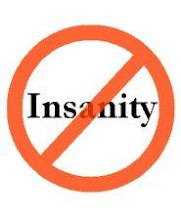
Here's your proof!
A friend of mine (Temy Beal) is a great believer in hard evidence and in denying any premise that lacks empirical proof. Having once been deeply embedded in the religious world, and having escaped that prison through the application of this empirical belief system, it is easy to understand why he holds this belief system in such high esteem. Philosophical arguments hold little sway with this friend, and given the trouble philosophical arguments have created in human history (religion springs to mind), who can blame him? He needs hard evidence, and a handful of "soft" evidence just won't do. For example, he wouldn't be caught dead believing in extra-terrestrials unless he could grapple one to the ground and subject it to a battery of laboratory tests. Many highly rational people would applaud this mindset, including people he and I both admire, like Carl Sagan. But there is something very important that my friend is missing, and I'd like to try once again to demonstrate what that is.
For this illustration, I will be using an example that Temy presents in his very fine blog entitled "Philosophy". As an argument against the philosophical method and for empirical proof, Temy says:
If one does not believe that time is relative, for example, it means only that they are lacking this information or that they, for whatever reason, are incapable of grasping it. The empirical truth of it is demonstrated all the time, one way being that the clocks of GPS satellites must be continually adjusted to account for the different rates of the passage of time in orbit as opposed to the earth's surface, because gravity slows time.
For Temy, the fact that time is relative is without question because of empirical proof provided by such things as GPS satellites. The first key point that Temy is missing is that empirical proof itself is relative. He practically says as much in that first sentence when, "for whatever reason," people just don't get it. For most of history, the empirical evidence available to humans was that time was fixed and constant. Time did not appear relative at all. The days rolled by with measurable regularity (due to the Earth's spin), as did the months (the lunar cycle), and the years (the Earth's period of orbit). There were no GPS satellites, no General Theory of Relativity, and no questions about the variability of time, for very obvious reasons. Precision instruments called timepieces were invented that provided empirical evidence that time was more regular than a heartbeat. So how did we get from the belief that time is regular to the belief that time is variable?
That is the second key point that Temy is missing. We got there through philosophy. Before time was ever demonstrated to have variability, some people imagined it. Einstein claimed that his General Theory of Relativity was the result of "thought experiments" that he amused himself with during long walks through the countryside. He was simply engaging in philosophical debate with himself about the nature of time. And what fueled those mental debates were the paradoxes that his philosophical extrapolations produced. Einstein had no hard evidence or empirical proof that his theory was correct, but it had a consistent philosophical feel to it, and that was sufficient to lead him to search for ways to describe in mathematical terms those same ideas. Only after the theory was published were appropriate experiments designed to test and confirm Einstein's work.
So empirical proof may be a method to confirm truth, but it is often unavailable to get us there. The same can be said for hard evidence. Other more dangerous methods may be needed, like imagination, conjecture, testimony, speculation, observation, theories, etc. Sure, they can often lead to trouble when misused, but to dismiss any of these tools without good reason can be counterproductive, as Einstein's example demonstrates.
No amount of experimentation can ever prove me right; a single experiment can prove me wrong. -- Albert Einstein


No comments:
Post a Comment